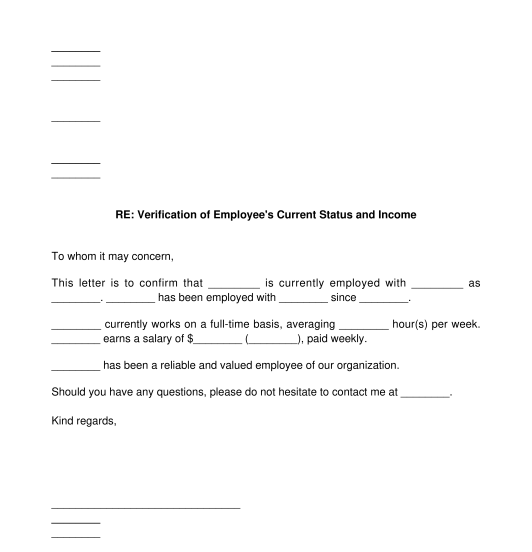 19/10/2025
19/10/2025

Answer a few questions and your document is created automatically.

Your document is ready! You will receive it in Word and PDF formats. You will be able to modify it.

 19/10/2025
19/10/2025
 Word and PDF
Word and PDF
 1 page
1 page
An Employment Verification Letter is a document provided by the employer confirming the employee's current employment status and income.
A potential employer may, for example, request an employment verification letter from an employee's current employer to confirm that the employee had worked for the employer at the salary indicated in their application and/or CV.
Landlords may also request a pre-rental employment verification letter to verify that the tenant is creditworthy. For example, if an individual is looking for a new apartment and a landlord wants to ensure that the prospective tenant will likely pay their rent, having a letter asking for employment confirmation may help reduce the likelihood of non-payment because the tenant is gainfully employed.
An employment verification letter cannot disclose confidential information of the employee, such as personal contact information, medical details, social insurance number, and more. The letter also cannot contain misleading or inaccurate information about the employee. The letter should remain as objective as possible and include employment status, job title, number of years of employment.
The letter must contain the employer's and employee's information, including their names and addresses.
It should also include the dates of employment, job title, and responsibilities, including what the employee had to do on a daily basis, what they were exposed to in the workplace, and what level of experience they have.
Once the letter is ready, it should be distributed to the employee so they can verify its accuracy. After, the letter may be delivered to the requesting party. The employer must keep a copy of the letter for their records, and the letter must be kept confidential.
There is no specific law that applies to this type of document. Rather, it is information that lenders/employers/landlords will require for verification purposes. Note, however, that the Personal Information Protection and Electronic Documents Act (PIPEDA), and its Provincial counterpart in certain jurisdictions, prohibit employers from revealing confidential employee information without consent. For example:
You fill out a form. The document is created before your eyes as you respond to the questions.
At the end, you receive it in Word and PDF formats. You can modify it and reuse it.
Employment Verification Letter - Sample, template
Country: Canada (English)